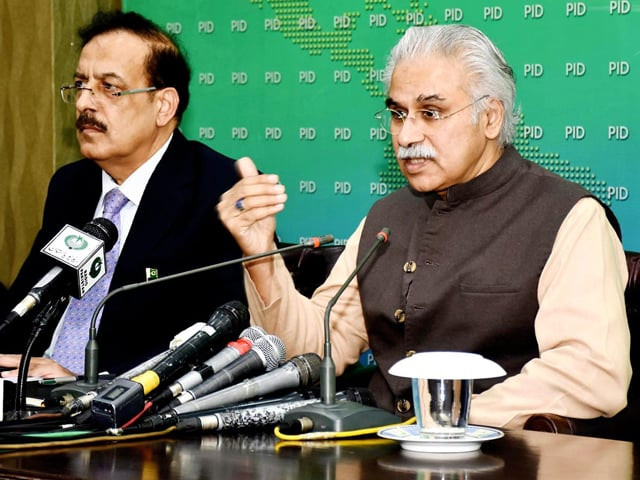In Pakistan, dengue victim count soars past 10,000
PM’s health adviser says situation will be under control by end of October

SAPM Dr Zafar Mirza addresses a news conference in Islamabad on Sunday. PHOTO: NNI
Prime Minister’s Special Assistant on National Health Services, Regulations, and Coordination Dr Zafar Mirza, while addressing a news conference here on Sunday, said there were 10,013 dengue patients at present in the country; out of which 2,363 were in Punjab, 2,258 in Sindh, 1,814 in Khyber-Pakhtunkhwa and 1,772 in Balochistan.
He said the number of dengue cases had exponentially increased during the last 48 hours, fearing that the toll may further increase in the coming days. The SAPM said that 70 per cent of the dengue cases in Punjab were reported from the Potohar region. A study would be conducted in the coming days to find out why the virus spread out so rapidly in this region, he added.
Dr Mirza said despite the federal government’s warning letter issued to all provincial governments on May 23, preventive measures were not taken in time to control the outbreak. He, however, maintained that the number of cases was still less than the previous years.
WHO teams visit Holy Family Hospital to inspect facilities for dengue patients
“In the past, there had been twice as more patients as compared to this figure, but right now we are solely concentrating on checking the outbreak rather than indulging in politics,” he remarked.
The SAPM said the federal government is coordinating with the provinces to curb the outbreak, assuring that concerted efforts are being made to check its spread.
Dr Mirza said that a dengue control operational center has been set up in Islamabad, which he added would review the dengue-related situation across the country on a daily basis. He said two hotlines with contact numbers (051-9212601 and 9216890) would work round-the-clock, where expert doctors would respond to the dengue-related queries to the general public.
The SAPM said an emergency centre had also been established at the National Institute of Health ten days ago and statistics, also available on NIH website, are being compiled there on a daily basis.
Keeping in view the possible increase in a number of dengue patients, Dr Mirza said owners of private hospitals in Islamabad have been contacted, who he said have assured the government that they would provide a total of 1,000 beds in their hospitals in case a capacity issue arises at the government hospitals.
Two more dies of dengue in Rawalpindi
Treatment at these private hospitals would be free of cost, he said and thanked the management of private hospitals over this gesture.
At least 16 basic health units in the capital have been made functional and trained doctors are providing treatment to dengue and other patients, said the adviser, adding that the most affected areas are being fumigated in coordination with the provincial governments.
Dog bite cases
Commenting on increasing numbers of dog bite cases throughout the country, the Special Assistant to Prime Minister admitted lack of anti-rabies vaccines (ARVs) in the country. He, however, added that the production of these vaccines would be doubled at NIH in coming years.
Lamenting over non-production of around 900,000 doses in the country during previous tenures, Dr Mirza assured that the Pakistan Tehreek-e-Insaf (PTI) government would take steps in this regard.
Hike in medicine prices
Responding to a query about the increase in prices of medicines, the SAPM said the government is implementing a strategy to fix the inflated prices. Dr Mirza said in May, prices of some medicines witnessed a surge of up to 200-300 per cent, but the prices were brought down to 75 per cent soon after.
The government, he said, is in contact with manufacturers and medicines prices would further decrease very soon.
(With additional input from APP)



















COMMENTS
Comments are moderated and generally will be posted if they are on-topic and not abusive.
For more information, please see our Comments FAQ